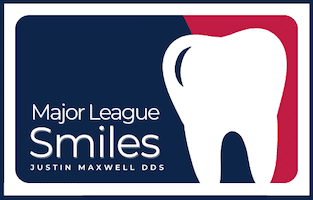Gum disease is a serious mouth infection that gets worse over time. It damages your gums and can even harm the bone that holds your teeth in place. Treating gum disease in the early stages can help prevent permanent damage that can ruin your gums, teeth, and bite. In advanced cases, restorative dental treatments may be necessary to repair damage and restore function.
Advanced gum disease is a leading cause of tooth loss in adults, which can impact your ability to chew and speak properly. Routine dental care visits allow Dr. Justin Maxwell and our team to spot the early signs of gum disease and quickly treat it before it gets worse.

Gum Disease Treatment in Ellicott City, MD
Periodontal disease is an infection of the soft tissues that hold your teeth in place. Poor brushing and flossing habits and a lack of dental care are two of the leading causes. Advanced stages of periodontal disease can severely damage your gums, bones, and other structures that support your teeth.
Untreated, periodontal disease can cause more than just oral health issues. Research shows a link between gum disease and other serious health problems, like cardiovascular disease, diabetes, and respiratory infections. That’s why treating gum disease early is so important for your health.
How Gum Disease Starts and Progresses
Gum disease develops slowly over time. Many people don’t realize they have it until it’s already serious. That’s why dentists call it a “silent disease”. Regular checkups are the best way to catch it early.
The early stage of gum disease is called Gingivitis. This is when your gums might look redder than normal, feel puffy, or bleed when you brush. At this point, it’s completely reversible with good brushing, flossing, and professional cleanings. Our hygienists always check for these warning signs during your visit.
The advanced stage is called Periodontitis. If gingivitis isn’t treated, the infection spreads deeper. Your gums start pulling away from teeth and create spaces that get infected. This can destroy the bone holding your teeth in place over time. You might notice teeth feeling loose in serious cases.
Catching gum disease early makes treatment much easier. Plus, healthy gums protect your whole body since mouth infections can affect your overall health. That’s why we emphasize regular cleanings. They’re not just about keeping teeth clean, but protecting your gums too.
Treating Gum Disease
Think of your gums like the foundation of a house. They need to be strong to support your teeth. Dr. Maxwell always reminds patients that healthy gums are just as important as healthy teeth.
If you’ve had gum problems before, we might suggest coming in for cleanings a little more often. These extra visits help us keep a close eye on your gum health and catch any changes early. It’s like giving your smile regular tune-ups to prevent bigger problems. Our gum treatments include:
- Non-Surgical Treatments: We can often treat periodontal disease with non-surgical methods in the early stages. Scaling and root planing is a deep-cleaning procedure that doesn’t involve surgery. The process involves removing plaque and tartar from above and below your gum line. Then, we prescribe antibiotic treatments to reduce the bacterial infection and heal your gums.
- Surgical Procedures: In more advanced cases, surgical treatments may be necessary. Dr. Justin Maxwell can coordinate care with a local oral surgeon or periodontist to ensure the best outcome.
- Maintenance and Aftercare: After treatment, keeping your mouth healthy will keep gum disease from returning. Regular dental check-ups and cleanings monitor the health of your gums and also keep the disease from coming back. Dr. Maxwell provides comprehensive aftercare plans tailored to your needs.
Frequently Asked Questions
Can children or teenagers get gum disease?
Yes, kids can develop gingivitis, especially if they don’t brush and floss well. Hormonal changes during puberty can also make gums much more sensitive to irritation.
Does smoking really make gum disease worse?
Absolutely. Smoking weakens your immune system, and makes it harder for your body to fight gum infections. It also hides bleeding gums, so damage often goes unnoticed until it’s severe.
Are electric toothbrushes better for gum health?
Often, yes! Studies show electric brushes can remove more plaque along the gumline than manual ones. Dr. Maxwell can recommend the best type for your needs.
Will my dental insurance cover gum disease treatment?
Most plans cover at least part of periodontal care, like cleanings or scaling. Our team helps verify your benefits so you know costs upfront.
How painful is gum disease treatment?
We use numbing gels or local anesthesia to keep you comfortable. Many patients say deep cleanings feel like a regular cleaning but with slight pressure.
Can I reverse receding gums?
While gums don’t grow back, treatments can stop further recession and protect exposed roots. Treatments can also help heal the remaining gum tissue. This is why early action is important.
Why do my gums bleed even though I brush daily?
Bleeding usually means irritation from plaque buildup, even if you brush. You might miss spots near the gumline. Our hygienist can show you better techniques.
How soon should I come in if my gums are swollen?
Schedule within 1 to 2 weeks. Swelling often means an infection, and waiting risks bone loss. We offer same-day emergency slots for severe pain.
Schedule a Visit Today
Don’t wait for gum problems to become serious and costly issues. Whether you need a routine cleaning, specialized gum treatment, or just a check-in, Dr. Maxwell and our team are here to help. Early care keeps your gums strong and prevents future complications. Schedule your appointment today by calling (443) 335-8726 or request an appointment online.
